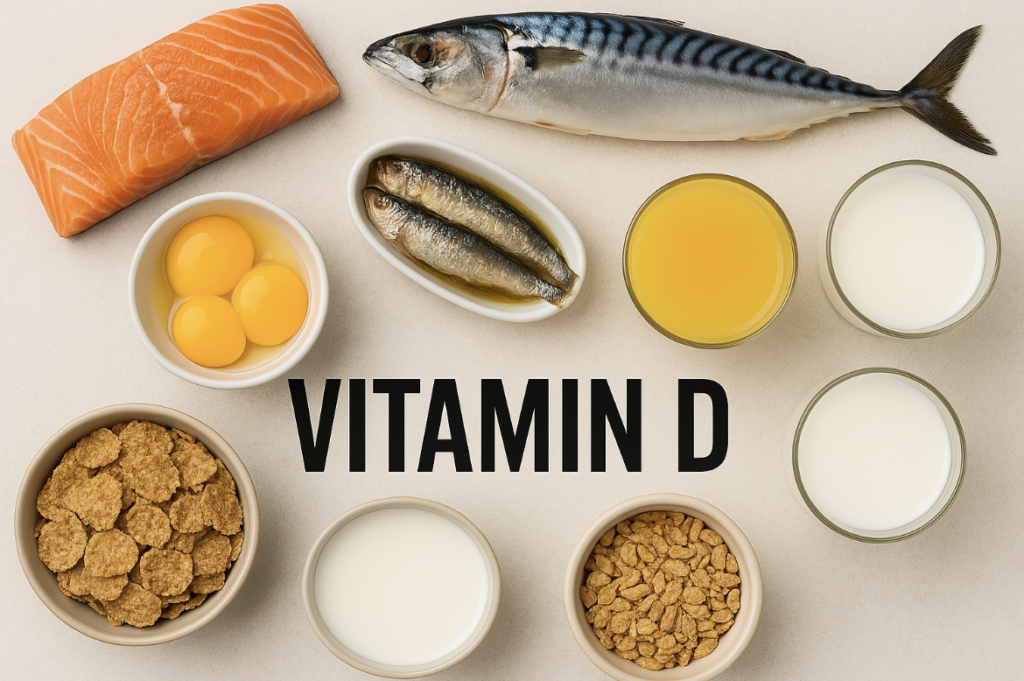Often called the “sunshine vitamin,” vitamin D is a fat-soluble nutrient that plays a key role in bone health, immune function, mood regulation, and more. Despite its importance, vitamin D deficiency is surprisingly common—affecting over 1 billion people worldwide. In this post, we’ll explore what vitamin D does in the body, how to spot deficiency symptoms, its pros and cons, ideal food and sunlight sources, and whether supplementation is right for you.
What Is Vitamin D?
Vitamin D is a fat-soluble vitamin that functions more like a hormone. It helps regulate calcium and phosphorus absorption, supports the immune system, and contributes to cell growth and neuromuscular function.
✔ Forms of Vitamin D:
- Vitamin D2 (ergocalciferol): Found in some plant-based foods
- Vitamin D3 (cholecalciferol): Found in animal products and synthesized by the skin through sun exposure
💡 Did You Know? Vitamin D3 is more effective at raising blood levels of vitamin D than D2.
Key Health Benefits of Vitamin D

✔ 1. Supports Bone Health and Prevents Fractures
Vitamin D helps your body absorb calcium and phosphorus, making it essential for strong bones and teeth. A deficiency can lead to rickets in children and osteomalacia or osteoporosis in adults.
✔ 2. Boosts Immune Function
Vitamin D plays a critical role in modulating the immune response. Adequate levels may help reduce the risk of respiratory infections and support recovery.
✔ 3. Improves Mood and Mental Health
Low levels of vitamin D have been linked to depression, seasonal affective disorder (SAD), and anxiety.
✔ 4. May Reduce Risk of Chronic Diseases
Emerging research suggests vitamin D may help lower the risk of cardiovascular disease, type 2 diabetes, and certain cancers.
✔ 5. Supports Muscle Strength and Function
Vitamin D helps maintain muscle mass, reduce fall risk in older adults, and enhance post-exercise recovery.
Signs of Vitamin D Deficiency
Because symptoms can be subtle, deficiency is often missed.
⚠️ Common Signs of Low Vitamin D:
- Fatigue or low energy
- Frequent colds or infections
- Bone pain or muscle weakness
- Mood changes (especially depression or irritability)
- Hair loss or slow wound healing
💡 Risk Groups: People with darker skin, older adults, indoor workers, people living in northern climates, and those with digestive disorders or obesity are more likely to be deficient.
Best Sources of Vitamin D

Getting enough vitamin D is tricky, especially if you rely on diet alone.
☀️ Sunlight Exposure:
- 10–30 minutes of midday sun exposure to arms, face, and legs several times a week
- Factors like skin tone, age, sunscreen, latitude, and season affect production
🍽️ Food Sources:
- Fatty fish (salmon, sardines, mackerel)
- Egg yolks and beef liver
- Fortified foods (milk, orange juice, cereals, plant-based milks)
💊 Tip: Vitamin D is fat-soluble—eat it with healthy fats to boost absorption.
Recommended Daily Intake
- Infants (0–12 months): 400 IU (10 mcg)
- Children & Adults (1–70 years): 600 IU (15 mcg)
- Adults over 70 years: 800 IU (20 mcg)
- Higher doses may be needed for those with deficiencies (consult a doctor)
Supplement Considerations
Vitamin D supplements are one of the most common and effective ways to correct deficiency.
💊 Best Forms:
- Vitamin D3 (cholecalciferol): Preferred for supplementation
- Liquid, capsule, and sublingual forms available
⚠️ Too Much Vitamin D?
Excessive intake (>4,000 IU/day) can lead to toxicity—causing nausea, kidney stones, and calcium buildup in the blood (hypercalcemia).
💡 Tip: Get a blood test to assess your 25(OH)D levels before supplementing heavily.
Pros and Cons of Vitamin D
✔ Pros:
- Supports strong bones, mood, and immunity
- Easy to supplement and monitor
- May reduce risk of chronic illness
⚠️ Cons:
- Difficult to obtain sufficient amounts from diet alone
- Risk of overdose with high-dose supplements
- Not always absorbed well by people with fat malabsorption conditions
Vitamin D plays a vital role in bone strength, immune support, and emotional well-being. Despite its nickname as the “sunshine vitamin,” many people don’t get enough—especially during the winter months or with limited sun exposure. By focusing on safe sunlight, vitamin D-rich foods, and (when necessary) smart supplementation, you can keep your vitamin D levels in a healthy range and support your long-term health.
Read more on magnesium benefits and deficiency
Learn more about vitamin D from the Mayo Clinic
